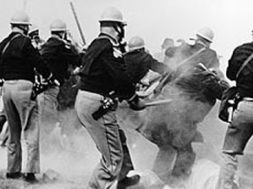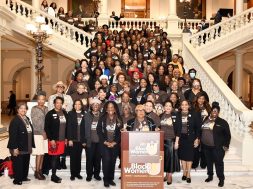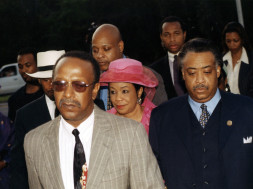
A Street Lesson in Domestic Violence and the Meaning of the N-word

However, the video is very disturbing in a certain respect: All involved parties are black, and as the brother drops vengeful blows on the abuser of his sister, he uses the epithet “n**ger” numerous times. There is far more going on here than just a brother taking up for his sister—it’s also a lesson in the true intent and the dual-sidedness of the n-word.
As the brother hovers staunchly and remorseless, with all power balled-up in his hands, over the helpless, curled-up soul, he spits the term at the abuser from hard, tightened lips, daring him to move outside of his mete. The abuser takes the beating and dares not make a move shy of the brother’s approval—he stays in his place. This scene is a perfect metaphorical depiction of White America’s intent in the term and the desired reaction of black America—to stay in its place, wounded and defenseless.
Furthermore, the n-word wasn’t being used endearingly but derogatorily and from a vicinity of hate. An acceptable notion exists in the black community that not only is it okay to use the word as a “term of endearment”, but as an insult as well.
Now, if proponents of the term say that the term has no power, they’ve changed the meaning of the term, and anyone of any race can be called a “n**ger”— noting that it’s no longer a race-based term, how can the term still be used as a term of hate or degradation ONLY toward an African-American? If one becomes angered with a non-black person, we do not blurt out the n-word to insult them—some other profanity may be used; however, as soon as one becomes angered with another black person, we spit-fire the n-word at them to offend them.
Even though the term is sometimes used as an endearing term, it can be and is invoked at will to administer its crippling and true meaning.
A psychosis exists about the n-word that the black community, in general, completely denies or misses (is blinded to). The ravages of centuries of brutal mistreatment at the hands of whites—through slavery, Jim Crow segregation and lynch mobs— still has a powerful psychological effect on black people.
Isn’t it ironic how many contemporary blacks use and/or condone use of the n-word in this 21st century—a word that was handed to them by a racist 18th century institutionalized system?
Before we were humanized white folks categorized black folks centuries ago as the n-word and to this very day, many blacks have failed to deviate from their so-called appointed place and entitlement of being so categorized.
A metamorphous is required. We, as a community, [must] allow the unhealthy, hindering, and destructive aspects of our past to die and establish healthy, progressive, and constructive mentalities to successfully live in the now. It’s hard and quite scary to think of dying, to think of burying something we have so long lived with. We often think that because we have lived with a thing for so long, that it’s right and normal; to the contrary, that very thing we’ve been living with could be the primary factor holding us back from reaching our maximum potential. Think about that addiction to smoking, an abusive lover, and acceptance of less-than ideal circumstances. Just because it’s “the way it’s always been,” doesn’t mean it’s “the way it’s gotta continue to be.
H. Lewis Smith is the founder and president of UVCC, the United Voices for a Common Cause, Inc.; http://www.theunitedvoices.com and author of Bury that Sucka: A Scandalous Love Affair with the N-Word.








